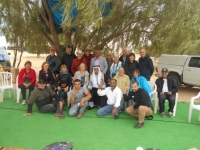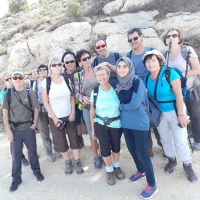Practical Information for SIRAJ PROGRAM PARTICIPANTS
Climate and weather
Palestine’s climate is essentially Mediterranean, with hot summers, cold winters and a mild spring and autumn. Temperatures can reach 40 degrees centigrade midday in midsummer, but the nights are cool in the mountains and desert. There is no rainfall in the summer (June – Sept), but winter brings rain as well as snow to the mountains.
The most beautiful times of the year to visit the area are March to May and September to November. Early spring brings plentiful wildflowers; in late autumn, families are out harvesting the olive trees, and you may well be invited to sit and drink tea with them. If you do visit in the summer, be prepared for very hot weather.
Accommodation
In addition to the hotels on your itinerary, your program may also include the opportunity for homestays in Palestinian family homes, where you may be able to meet children, grandparents, and extended families while sharing their fresh, home-cooked traditional food. All homestays are in homes with electricity and running water. Do note, however, that Palestine is among the most water-challenged countries in the world, so you should use water with great care. If you have the opportunity to shower, make it a quick one. There will always be plenty of bottled drinking water.
Eating and drinking
Traditional Middle Eastern meals – breakfast, too – usually consist of flat bread, cheese, yoghurt, humus, olives and salads. Dinner may include a typical Palestinian cooked dish, often including rice with chicken or meat.
Palestine is primarily a Muslim country, so alcohol is hard to find in some areas and will not be offered in many settings. Be prepared for endless tiny glasses of sweet black tea, often served with mint, and for grainy, delicious Turkish-style coffee after meals.
In Jerusalem and in Bethlehem, you can find wine and beer in many restaurants. The town of Taybeh, northeast of Ramallah, is home to Palestine’s first brewery. Here you can sample a high-quality, organic lager beer brewed in accordance with the German purity laws of 1516! If you pass through in September or October, you might find the Taybeh version of Bavaria’s legendary Oktoberfest in full swing – two days of Palestinian celebration, music and culture.
Getting there
Traveling to Israel and Palestine is fairly straightforward for European and US travellers. Several airlines offer flights from Europe and the US to Tel-Aviv (Ben Gurion International Airport), which is about a one-hour bus or shared taxi (sheroot) ride away from Jerusalem. If you are arriving from other parts of the Middle East, you will need to check on specific border crossings and routes. Our tour operators can provide advice on the journey and on where to meet.
Be especially sure to familiarize yourself with Israel’s latest entry requirements regarding Covid protocols. You can find them HERE. (Add link)
What to wear
You will need good, comfortable walking shoes and light-weight, easily-washable clothing. Sandals are acceptable, but be sure that they are adequate to navigate sometimes-uneven stone paths. It helps to have the capacity to layer your clothing, since the temperature on a single day can move from cool to hot and back again to cool, depending on the season. Because your itinerary may take you to more rural or conservative areas on any day, both women and men are advised to dress accordingly to show respect to these communities. We ask that both women and men avoid wearing shorts or other clothing which exposes knees and/or shoulders. Three-quarter or full-length pants are appropriate. Please avoid low-cut shirts, tank tops, T-shirts with provocative images, or sheer clothing. Women are not required to cover their heads except in mosques and other holy places. We advise that women always travel with a scarf to be prepared to cover shoulders, arms, or head as needed. Occasionally, women are not allowed into holy sites if they are wearing pants. Because of this possibility, it is advised that women bring at least one skirt. All travelers should consider a hat for protection from the sun.
Looking after your health
Before you travel, be sure to refer carefully to the information provided here by the Israeli Ministry of Health for the most current COVID-19-related protocols.
With the exception of current COVID-19 guidelines, there are no special inoculations required for travel in Palestine, though it is recommended that you be up to date with immunizations against hepatitis A, polio, tetanus, tuberculosis, and typhoid fever. The greatest risks are from heat stroke/exhaustion, sunburn, dehydration and traveler’s diarrhea. All travelers should take the usual health precautions, carry water at all times, ensure that they drink only bottled water, protect themselves from the sun, and carry a small personal first aid kit.
Safety and security
Palestinians are a friendly and hospitable people with legendary respect for guests and visitors to their land. Despite the increase in security in the West Bank in recent years, it is clearly not possible for the Siraj Center to guarantee the personal safety of every traveler to Palestine. There is still an element of political tension and instability. Travelers are advised to visit the website of their home government for detailed and up-to-date information about the security situation in Israel and the Occupied Palestinian Territories (see below for relevant web links).
Petty travel-related crime – theft or pick pocketing - is extremely rare in Palestine. We advise that travelers exercise normal caution and use common sense in larger towns and cities.
For more details, refer to “Safety and Security Guidelines and Protocols.” https://sirajcenter.org/files/Siraj_Safety_and_Security.pdf
Insurance
Travel insurance is your responsibility and you are strongly advised to take out adequate travel insurance before you travel, including emergency health care and repatriation coverage.
Shopping
Street markets abound in all the major towns, selling everything from fruits and vegetables to sweets, toys and small jewelry. Good quality souvenirs and clothes are best sought in Jerusalem’s Old City, where the covered markets offer hours of great browsing, but prices can be high.
Managing your luggage
The lighter and more efficiently you are able to pack, the more easily your luggage can be transferred during the course of your travels. Bring a small day-pack to carry with you during the day, to hold essentials like a reusable water bottle, hat, sunscreen, camera, etc.
NOTE: To enhance your travel experience, be sure to refer also to “Helpful Travel, Health, and Cultural Information for All Visitors to the Region.”
https://www.walkpalestine.com/en/information
Revised 4/2022




